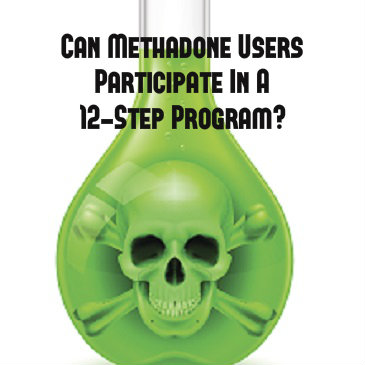Do Addicts Treated With Methadone Participate In 12-Step Programs?
Methadone is an opioid medication sometimes used to treat people addicted to heroin or other powerful opioid drugs. Affected individuals commonly receive this medication on an ongoing basis rather than for a limited period of time. This pattern of usage can potentially create conflicts with participation in self-help support groups called 12-step groups, which typically place a high emphasis on complete drug and alcohol abstinence. In a study published in late 2013 in the Journal of Groups in Addiction & Recovery, researchers from three U.S. institutions sought to determine how many people receiving methadone also participate in a 12-step program.
What Is Methadone?
 While methadone is an opioid substance, it has somewhat different properties than heroin or other opioid drugs of abuse. Those drugs are characterized by their ability to produce the rapid onset of a highly pleasurable state. Methadone, on the other hand, produces effects that build more slowly and result in a relatively low level of euphoric sensation. Doctors can exploit these properties and use methadone as a substitute for opioid drugs of abuse. Although an addict using methadone still has opioids in his or her bloodstream, he or she typically experiences a substantial reduction in the risk of drug-related harm. Although some addicted individuals receive only short-term methadone treatment, others participate in methadone maintenance treatment, an ongoing approach that uses methadone as an opioid drug replacement for extended periods of time.
While methadone is an opioid substance, it has somewhat different properties than heroin or other opioid drugs of abuse. Those drugs are characterized by their ability to produce the rapid onset of a highly pleasurable state. Methadone, on the other hand, produces effects that build more slowly and result in a relatively low level of euphoric sensation. Doctors can exploit these properties and use methadone as a substitute for opioid drugs of abuse. Although an addict using methadone still has opioids in his or her bloodstream, he or she typically experiences a substantial reduction in the risk of drug-related harm. Although some addicted individuals receive only short-term methadone treatment, others participate in methadone maintenance treatment, an ongoing approach that uses methadone as an opioid drug replacement for extended periods of time.
What Is A 12-Step Program?
Twelve-step programs get their name because they emphasize participation in a series of 12 consecutive “steps” as the key to overcoming a reliance on drugs or alcohol (or certain harmful behaviors). The specific steps undertaken vary from program to program; however, common features of most programs include admitting powerlessness over one’s harm-producing behavior, seeking some sort of spiritual assistance to cope with harm-producing behavior, assuming moral accountability for one’s harmful actions and making amends to people who suffer from one’s harmful actions.
As a rule, 12-step programs emphasize the need to stay substance-free. In order to help group members achieve this goal, they employ a sponsor system that relies on longer-term members to mentor shorter-term members and provide the encouragement needed to remain abstinent from substance use. Two of the most well known 12-step groups in the U.S. are Alcoholics Anonymous and Narcotics Anonymous.
How Many Methadone Users Participate In A 12-Step Program?
In the study published in the Journal of Groups in Addiction & Recovery, researchers from the Institute for Behavior and Health, Chestnut Health Systems and Partners in Drug Abuse Rehabilitation and Counseling investigated the degree of overlap between participation in methadone maintenance treatment and participation in a 12-step program. They conducted this investigation with the help of 322 adults currently participating in methadone programs. These adults were asked to submit information on their involvement in Alcoholics Anonymous and Narcotics Anonymous during the year prior to the start of the study. The researchers also asked them to detail their level of adherence to these 12-step groups’ program requirements.
The researchers found that fully two-thirds of the adults participating in methadone maintenance treatment also had a history of recent involvement with Alcoholics Anonymous, Narcotics Anonymous or both 12-step groups. Seventy-two percent of these individuals reported receiving important benefits from their involvement in Alcoholics Anonymous, while 77 percent reported receiving benefits from their involvement in Narcotics Anonymous.
Does A 12-Step Program Work For Methadone Users? And Why Are They Hiding Their Methadone Use?
However, the researchers concluded that, compared with 12-step members not using methadone, the methadone patients had a substantially smaller overall level of program involvement. For example, only half of the methadone-using members regularly attended meetings with a single group of 12-step practitioners. Only a quarter of the methadone-using members worked with a sponsor, and only 13 percent of these members ended up acting as sponsors for others. In addition, only 21 percent of the methadone users vigorously pursued the completion of the 12 steps that form the basis of 12-step programs.
The authors of the study published in the Journal of Groups in Addiction & Recovery found that roughly a quarter of all the methadone users who attended Alcoholics Anonymous or Narcotics Anonymous felt that their status as methadone recipients negatively affected their 12-step experiences. In addition, roughly one-third of all the methadone users actively hid their participation in methadone maintenance treatment from their 12-step peers. Altogether, the study’s findings indicate that methadone users who participate in 12-step programs experience widely varying outcomes from that participation.
Read About The Facts And Myths Of Methadone



